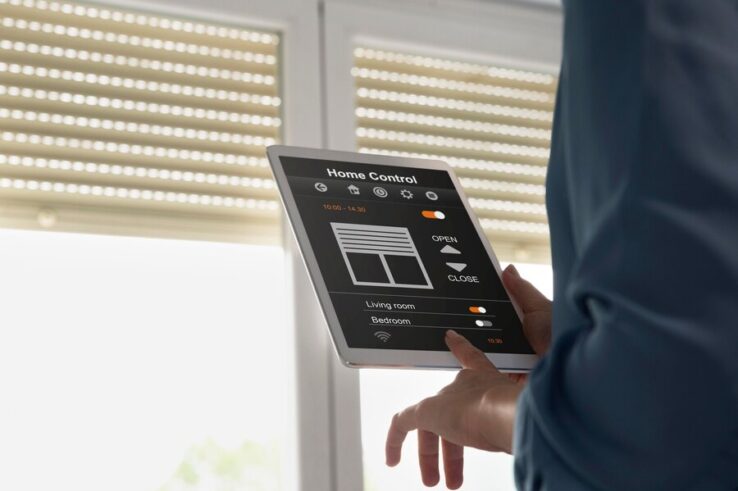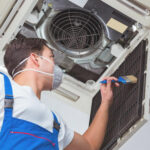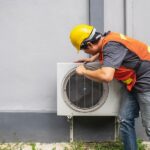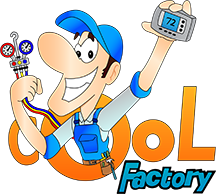
The Advantages of Smart HVAC System Integration
The Advantages of Smart HVAC System Integration
Smart HVAC systems have revolutionized the way we control indoor environments, offering a plethora of benefits beyond mere temperature regulation. These intelligent systems integrate cutting-edge technology with traditional heating, ventilation, and air conditioning (HVAC) mechanisms, resulting in enhanced comfort, energy efficiency, and cost savings. From remote accessibility and predictive maintenance to personalized climate control and environmental sustainability, the advantages of smart HVAC integration are undeniable. In this blog, we delve into the myriad benefits of adopting these sophisticated systems for residential and commercial spaces alike.
Smart HVAC Systems
Smart HVAC systems represent a groundbreaking advancement in climate control technology, merging cutting-edge sensors, algorithms, and connectivity to revolutionize indoor environments. Unlike traditional HVAC setups, these systems possess the ability to adapt to user preferences autonomously, refining settings in real-time and interfacing with other smart devices seamlessly.
Boasting capabilities such as remote access, predictive maintenance, and energy-conscious operation, smart HVAC systems redefine convenience, comfort, and sustainability standards. By harnessing these innovations, users experience unparalleled control over their indoor climate, optimized for both comfort and efficiency, ushering in a new era of intelligent and eco-conscious living spaces.
The Evolution of HVAC Technology
The evolution of HVAC technology has been nothing short of remarkable, progressing from rudimentary heating and cooling methods to sophisticated smart systems. Traditional HVAC units operated through manual adjustments and simplistic thermostats, providing only basic control and efficiency. However, advancements in sensor technology, data analytics, and connectivity have propelled HVAC systems into a new era.
Present-day smart HVAC solutions harness artificial intelligence, machine learning, and Internet of Things (IoT) connectivity to achieve precise temperature regulation, energy optimization, and personalized comfort. This transformative progression signifies a paradigm shift in indoor climate control, offering unprecedented levels of efficiency and sophistication to meet modern demands.
Remote Accessibility: Control Anytime, Anywhere
Remote accessibility is a cornerstone feature of smart HVAC systems, empowering users to manage indoor climate settings from any location worldwide. Utilizing dedicated mobile apps or web interfaces, homeowners and facility managers gain the ability to adjust temperature settings, track energy consumption, and receive instant notifications in real-time, all through their smartphones or computers.
This unprecedented flexibility not only enhances convenience but also facilitates proactive indoor environment management. Whether users are away from home or the office, remote accessibility ensures optimal comfort and efficiency, allowing for seamless control and monitoring of HVAC systems regardless of geographical location.
Preventing Problems Before They Occur
Smart HVAC systems integrate predictive maintenance capabilities, preempting issues before they arise. Through analysis of sensor data, these systems detect anomalies like reduced efficiency or irregular temperature fluctuations, prompting timely corrective actions. This proactive stance minimizes downtime and repair costs, prolonging HVAC equipment lifespan. By swiftly addressing potential problems, smart HVAC ensures uninterrupted comfort and reliability for occupants while curbing long-term maintenance expenses.
This predictive maintenance feature not only safeguards against costly breakdowns but also enhances system efficiency, making smart HVAC systems indispensable for maintaining optimal indoor environments without unexpected interruptions or hefty repair bills.
Tailoring Comfort to Your Preferences
Smart HVAC systems redefine comfort by offering personalized climate control, tailoring environments to individual preferences. Utilizing advanced algorithms and user input, these systems adjust temperature, airflow, and other parameters to craft the perfect indoor atmosphere for enhanced comfort and productivity.
By analyzing occupancy patterns, time-based needs, and specific user profiles, smart HVAC technology ensures that each space maintains optimal conditions, aligning precisely with occupants’ desires and requirements. This tailored approach not only enhances satisfaction but also promotes overall well-being, making smart HVAC systems invaluable assets in creating environments where occupants feel truly at home.
Energy Efficiency: Saving Costs and the Environment
One of the most significant advantages of smart HVAC systems is their ability to deliver superior energy efficiency, resulting in substantial cost savings and environmental benefits. These systems employ a range of energy-saving features, including programmable scheduling, occupancy sensors, and adaptive algorithms, to optimize heating and cooling operations based on actual usage patterns and environmental conditions.
By minimizing wasted energy and reducing unnecessary runtime, smart HVAC technology helps lower utility bills, decrease carbon emissions, and lessen the environmental impact associated with building operations, contributing to a more sustainable and eco-friendly future.
Cost Savings: How Smart HVAC Systems Pay for Themselves
Investing in smart HVAC systems may appear daunting initially, but their long-term cost-saving benefits often surpass the initial investment. Through energy efficiency optimization, predictive maintenance, and remote accessibility features, these systems slash utility bills, curtail repair expenses, and prolong HVAC equipment lifespans. By prioritizing energy conservation and operational efficiency, smart HVAC systems offer a compelling return on investment.
With lower energy bills and reduced maintenance costs, these systems eventually offset their upfront expenses, simultaneously elevating comfort and convenience for occupants. Their ability to deliver substantial savings while enhancing indoor environments makes smart HVAC systems an invaluable asset for both residential and commercial spaces alike.
Enhanced Comfort: Creating the Perfect Indoor Environment
Smart HVAC systems are engineered to transcend ordinary temperature regulation, placing occupant comfort and well-being at the forefront by crafting the ideal indoor environment. Through meticulous management of temperature, humidity, airflow, and air quality, these systems guarantee occupants encounter conditions precisely aligned with their desires and requirements.
Whether ensuring steady temperatures, adapting settings in response to occupancy fluctuations, or purifying air from pollutants and allergens, smart HVAC technology enriches comfort by fostering a healthier, more enjoyable indoor milieu. By prioritizing occupant contentment and well-being, these systems foster heightened productivity, enhanced health, and an overall sense of welfare, underscoring their indispensable role in modern living spaces.
Seamless Integration: Bridging Technology with Traditional HVAC
Smart HVAC systems showcase a mastery in harmonizing advanced technology with traditional HVAC frameworks, providing seamless compatibility with existing equipment and protocols. Whether retrofitting older systems with smart sensors and controllers or integrating new components into an established HVAC network, these systems guarantee effortless interoperability and streamlined communication among diverse devices.
By effortlessly bridging the chasm between legacy systems and contemporary technology, smart HVAC solutions facilitate incremental upgrades and improvements without necessitating a total infrastructure overhaul. This pragmatic approach renders them a cost-efficient and pragmatic option for both residential and commercial settings, promising enhanced functionality and convenience without disruption.
Sustainability: Reducing Environmental Impact
Smart HVAC systems are gaining popularity as a sustainable solution for businesses and homeowners, offering innovative features to reduce energy consumption and promote eco-friendly practices. Let’s explore how these systems contribute to sustainability by reducing environmental impact.
- Energy Efficiency: Smart HVAC systems leverage advanced technologies like variable-speed compressors and occupancy sensors to optimize energy usage, resulting in reduced electricity consumption and lower greenhouse gas emissions.
- Renewable Energy Integration: Many smart HVAC systems are designed to seamlessly integrate with renewable energy sources such as solar panels or geothermal systems, further reducing reliance on fossil fuels and promoting clean energy adoption.
- Demand Response Capabilities: By participating in demand response programs, smart HVAC systems can adjust their operation during peak electricity demand periods, helping to alleviate stress on the grid and reduce the need for additional power generation.
- Indoor Air Quality Management: Smart HVAC systems employ advanced filtration and ventilation strategies to maintain optimal indoor air quality, reducing pollutants and allergens that can harm both occupants and the environment.
Residential Applications: Smart HVAC for Modern Homes
Smart HVAC systems are revolutionizing the way modern homes manage indoor comfort and energy usage. With features like remote accessibility, personalized climate control, and energy efficiency optimization, these systems offer homeowners unprecedented control over their indoor environment.
Whether it’s adjusting temperatures from a smartphone app, scheduling heating and cooling cycles based on occupancy patterns, or integrating with other smart home devices, smart HVAC technology ensures that residents enjoy a comfortable and energy-efficient living space tailored to their preferences. From single-family residences to apartment complexes, smart HVAC systems are becoming an essential component of modern home automation.
Commercial Applications: Efficiency Solutions for Businesses
Efficiency and cost-effectiveness are paramount concerns for businesses seeking to optimize their operations and enhance profitability. Smart HVAC systems offer tailored solutions to meet the unique needs of commercial spaces, providing energy-efficient heating, ventilation, and air conditioning (HVAC) solutions that reduce utility expenses and improve indoor comfort.
Whether it’s controlling temperature zones, monitoring air quality, or implementing demand-based ventilation systems, smart HVAC technology helps businesses minimize energy waste while maintaining optimal working conditions for employees and customers alike. From office buildings and retail stores to hotels and healthcare facilities, smart HVAC systems are indispensable tools for enhancing efficiency and productivity in commercial environments.
The advantages of integrating smart HVAC systems are undeniable. From enhanced comfort and energy efficiency to sustainability and cost savings, these systems offer a multitude of benefits for both residential and commercial applications. If you’re ready to experience the transformative power of smart HVAC technology, contact Cool Factory, Inc.
Our team of experts is here to help you harness the full potential of these innovative systems. Give us a call at (703) 713-5113 or visit our location in Sterling, VA, to learn more about how we can tailor a smart HVAC solution to meet your needs. Upgrade your comfort and efficiency with Cool Factory today!






